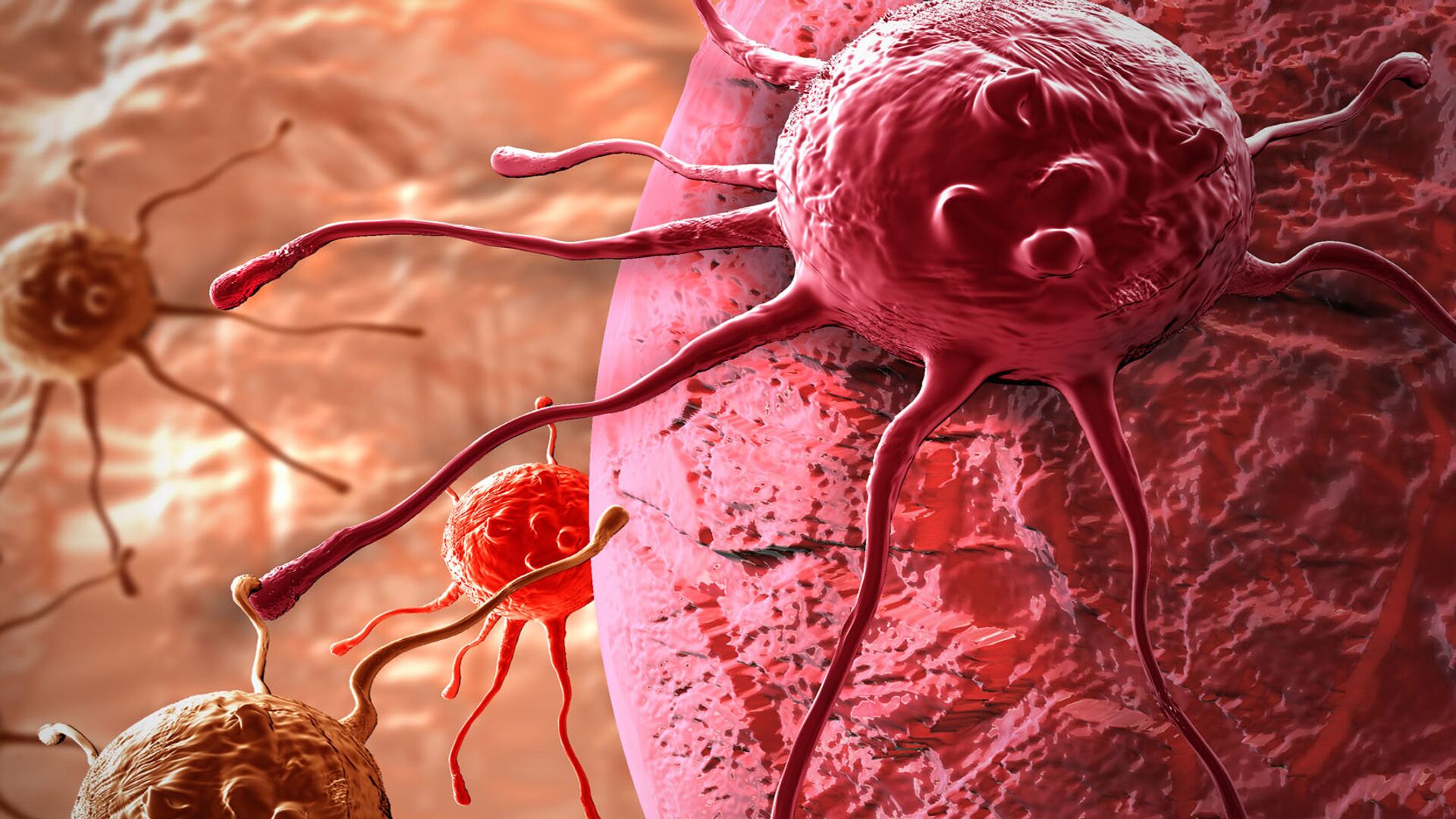https://sputnikglobe.com/20220924/cold-sore-virus-modified-to-kill-tumors-may-offer-patients-lifeline-early-trials-show-1101173595.html
Cold Sore Virus Modified to Kill Tumors May Offer Patients Lifeline, Early Trials Show
Cold Sore Virus Modified to Kill Tumors May Offer Patients Lifeline, Early Trials Show
Sputnik International
The novel virus therapy was described as eliciting "truly impressive" responses in early human trials in the UK, with very mild side effects in the main. 24.09.2022, Sputnik International
2022-09-24T12:31+0000
2022-09-24T12:31+0000
2023-05-28T15:21+0000
science & tech
cancer
herpes
national health service (nhs)
immune system
united kingdom (uk)
https://cdn1.img.sputnikglobe.com/img/105932/19/1059321930_566:0:2278:963_1920x0_80_0_0_256fbbb8d01701da4a6a0818ad38dac8.jpg
A new type of cancer therapy has been touted as very promising in early human trials in the UK, potentially offering a lifeline to patients.The drug used is based on a weakened form of the cold sore virus - herpes simplex - according to findings presented at the European Society of Medical Oncology conference in Paris, France.The common virus was modified by researchers to infect and destroy harmful cancer cells. The injections directly into the tumor allow the virus to attack cancerous cells, activating the immune system and making the cells burst, researchers told the BBC.About 40 patients have tried the treatment as part of the trials run by the Institute of Cancer Research and the Royal Marsden NHS Foundation.Two versions of the drug were used: some patients were given the virus injection called RP2, on its own. Others in the trial received another cancer drug - nivolumab - as well as the injection. Three out of nine patients given only RP2 saw their tumors shrink. Seven out of 30 who received combined treatment also appeared to benefit, experiencing only mild side effects, such as tiredness.The treatment responses seen were "truly impressive" in the case of advanced cancers, including oesophageal cancer and a rare type of eye cancer.Experts acknowledged that further studies were needed."I am keen to see whether we continue to witness benefits as we treat increased numbers of patients."Dr Marianne Baker, from Cancer Research UK, said that the findings are very encouraging.
https://sputnikglobe.com/20220617/uks-healthcare-system-approves-new-effective-breast-cancer-drug---reports-1096404300.html
united kingdom (uk)
Sputnik International
feedback@sputniknews.com
+74956456601
MIA „Rossiya Segodnya“
2022
News
en_EN
Sputnik International
feedback@sputniknews.com
+74956456601
MIA „Rossiya Segodnya“
Sputnik International
feedback@sputniknews.com
+74956456601
MIA „Rossiya Segodnya“
science & tech, cancer, herpes, national health service (nhs), immune system, united kingdom (uk)
science & tech, cancer, herpes, national health service (nhs), immune system, united kingdom (uk)
Cold Sore Virus Modified to Kill Tumors May Offer Patients Lifeline, Early Trials Show
12:31 GMT 24.09.2022 (Updated: 15:21 GMT 28.05.2023) The novel virus therapy was described as eliciting "truly impressive" responses in early human trials in the UK, with very mild side effects in the main.
A new type of
cancer therapy has been touted as very promising in early human trials in the UK, potentially offering a lifeline to patients.
The drug used is based on a weakened form of the cold sore virus - herpes simplex - according to
findings presented at the European Society of Medical Oncology conference in Paris, France.
The common virus was modified by researchers to infect and destroy harmful cancer cells. The injections directly into the tumor allow the virus to attack cancerous cells, activating the immune system and making the cells burst, researchers told the BBC.
About 40 patients have tried the treatment as part of the trials run by the Institute of Cancer Research and the Royal Marsden NHS Foundation.
Two versions of the drug were used: some patients were given the virus injection called RP2, on its own. Others in the trial received another cancer drug - nivolumab - as well as the injection. Three out of nine patients given only RP2 saw their tumors shrink. Seven out of 30 who received combined treatment also appeared to benefit, experiencing only mild side effects, such as tiredness.
The treatment responses seen were "truly impressive" in the case of advanced cancers, including oesophageal cancer and a rare type of eye cancer.
"I had injections every two weeks for five weeks which completely eradicated my cancer. I've been cancer-free for two years now," said one 39-year-old patient, diagnosed in 2017 with cancer of the salivary glands, who took part in the ongoing Phase One safety trial.
Experts acknowledged that further studies were needed.
"It is rare to see such good response rates in early stage clinical trials, as their primary aim is to test treatment safety, and they involve patients with very advanced cancers for whom current treatments have stopped working," lead researcher Professor Kevin Harrington of the Institute of Cancer Research, told the BBC, adding:
"I am keen to see whether we continue to witness benefits as we treat increased numbers of patients."
Dr Marianne Baker, from Cancer Research UK, said that the findings are very encouraging.
"This new viral therapy shows promise in a small-scale early trial - now we need more studies to find out how well it works. Research suggests that combining multiple treatments is a powerful strategy, and virus therapies such as this one could become a part of our toolkit for beating cancer," Baker was cited as saying.


